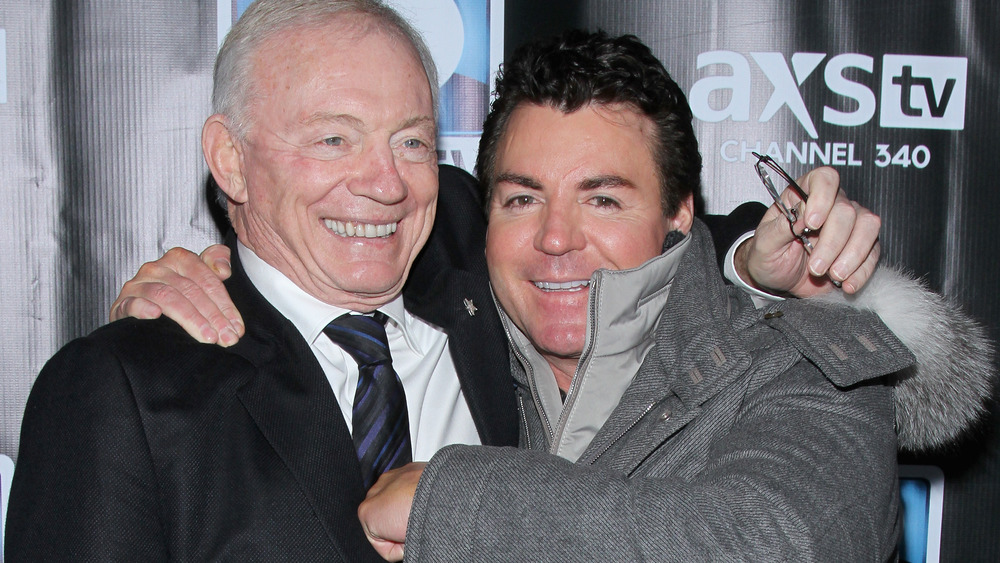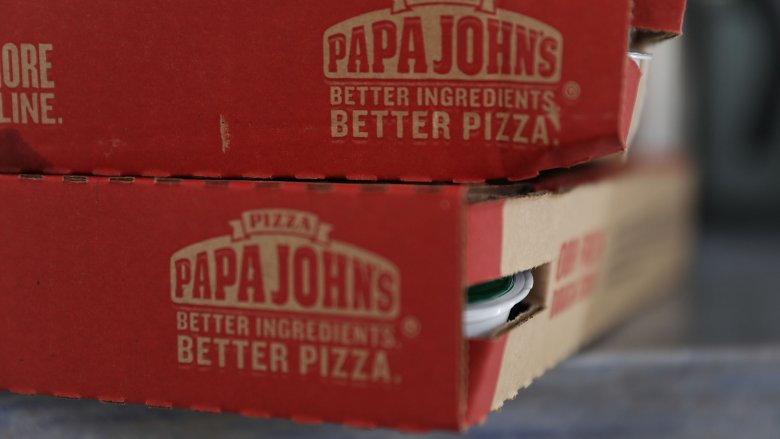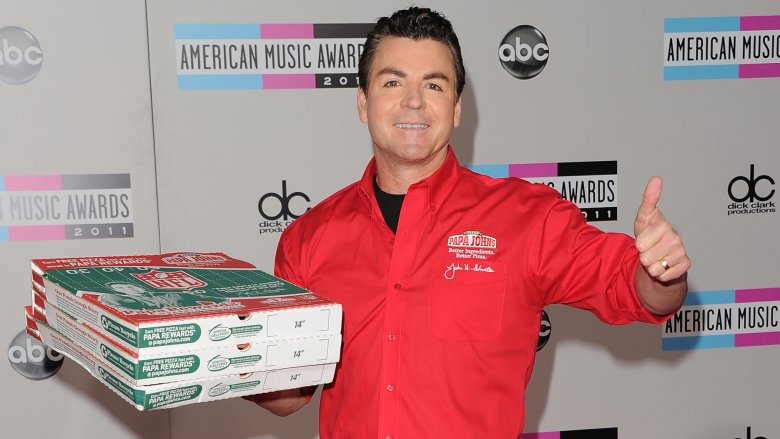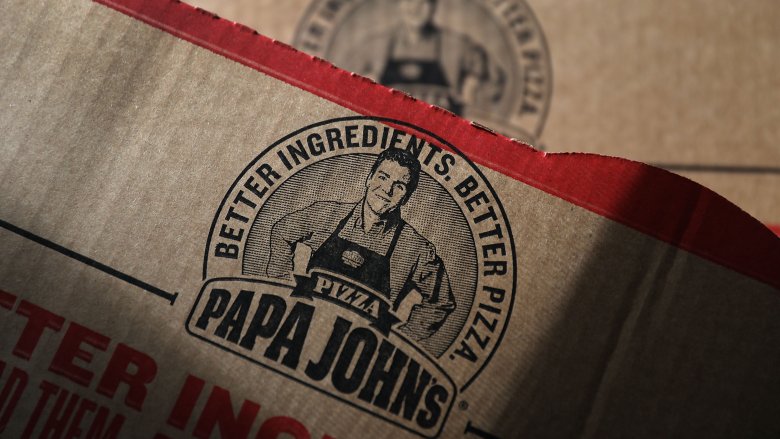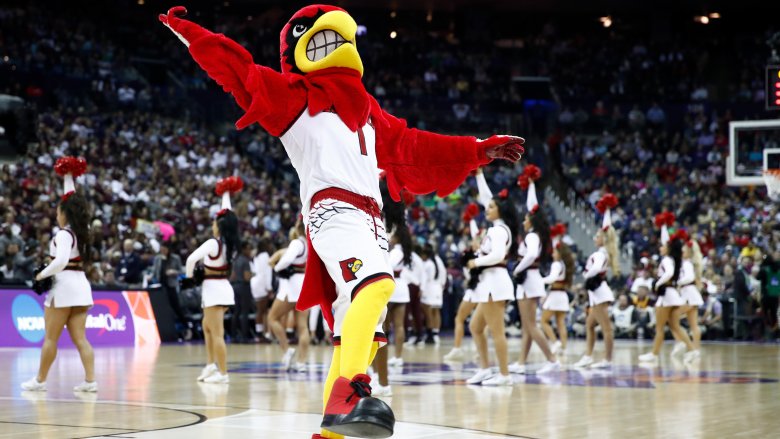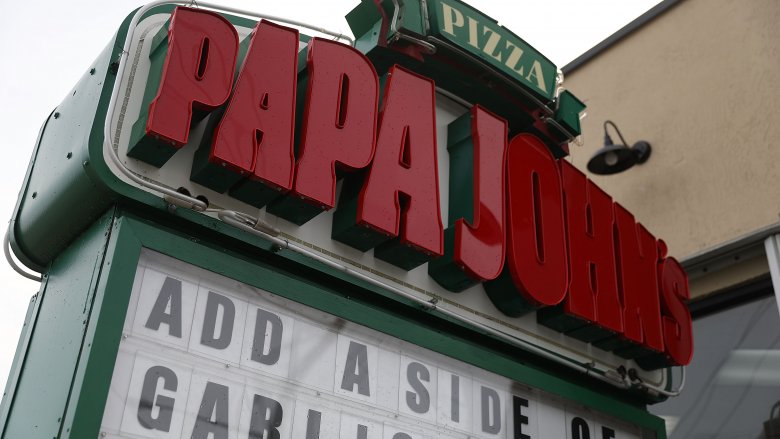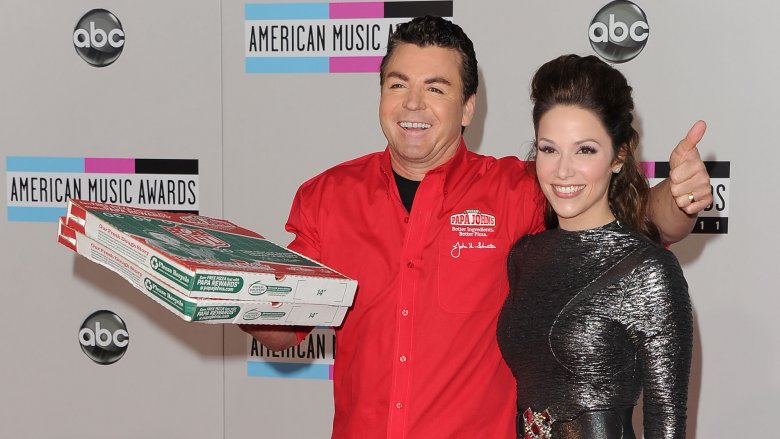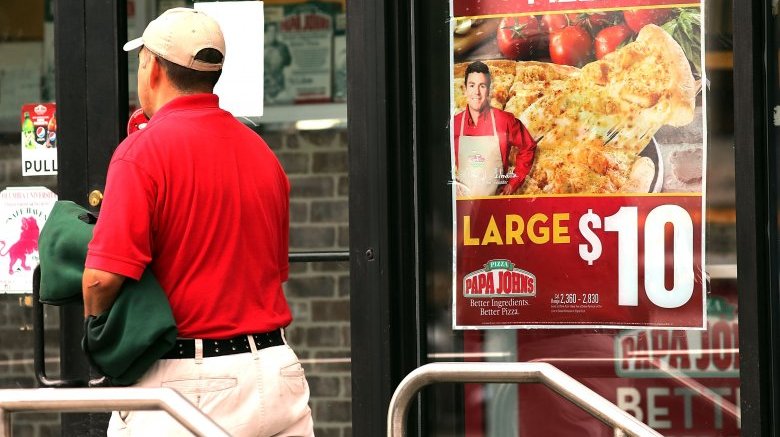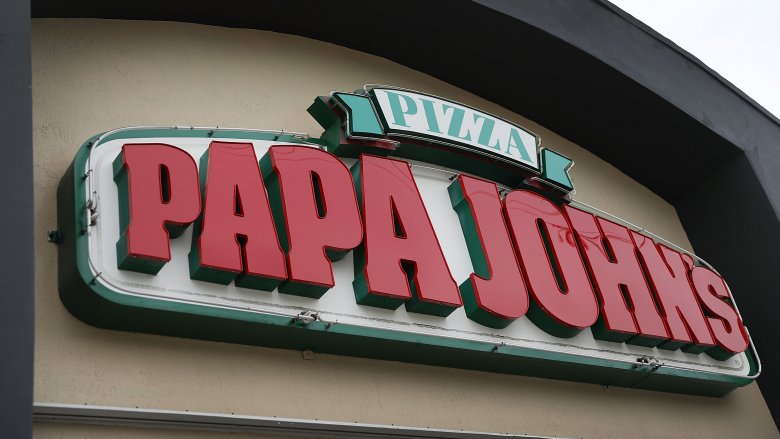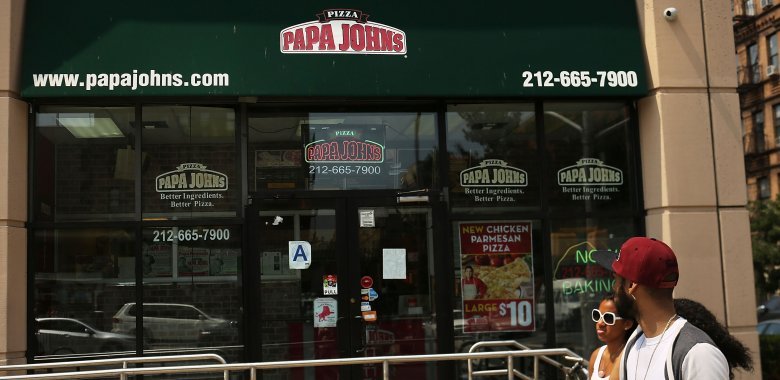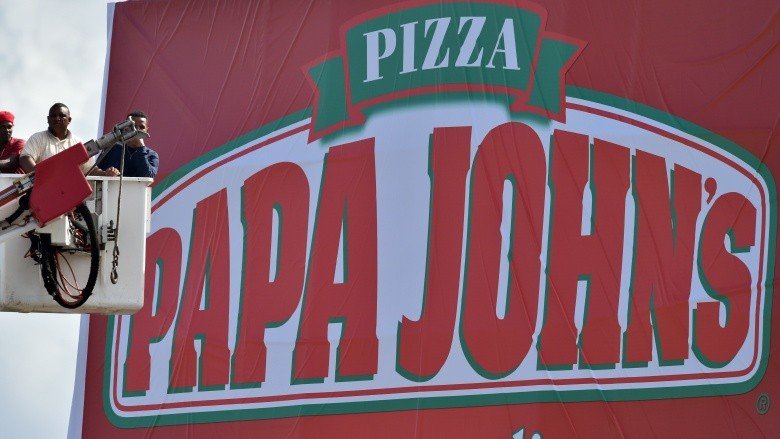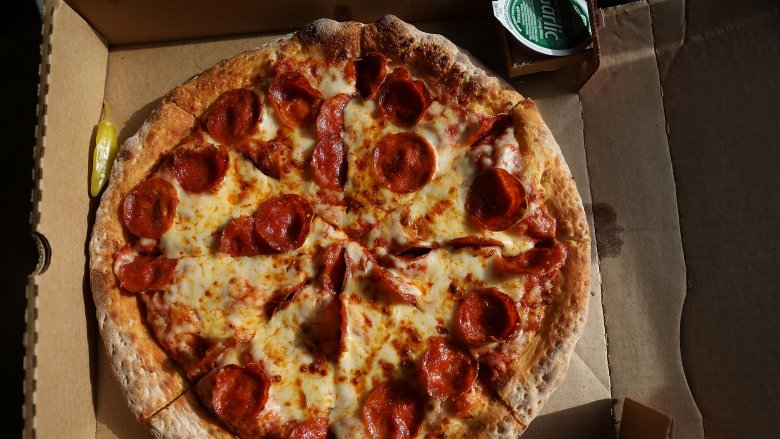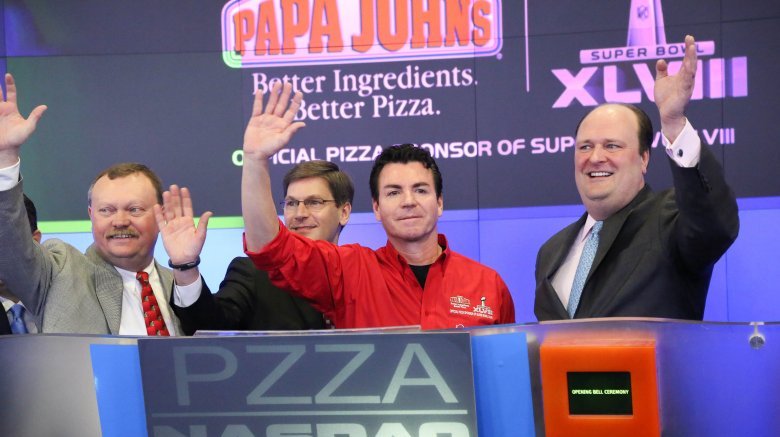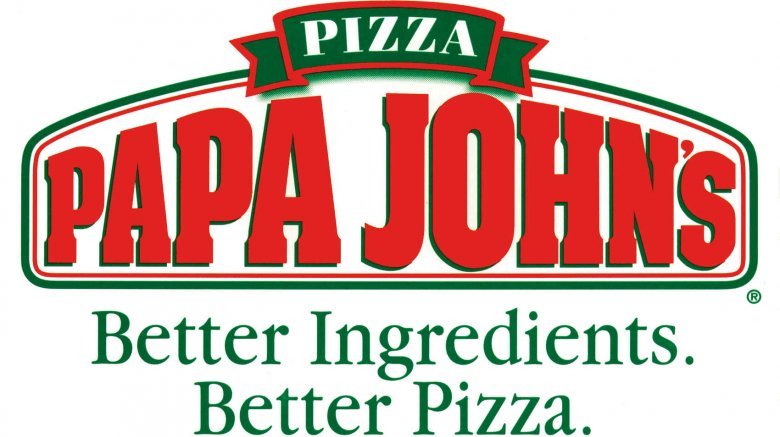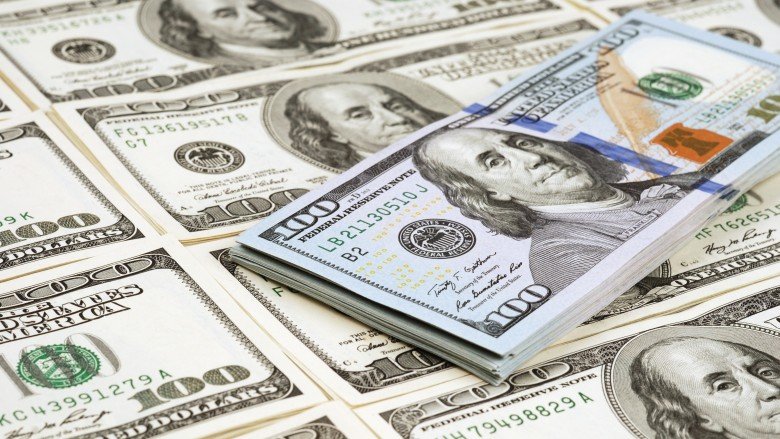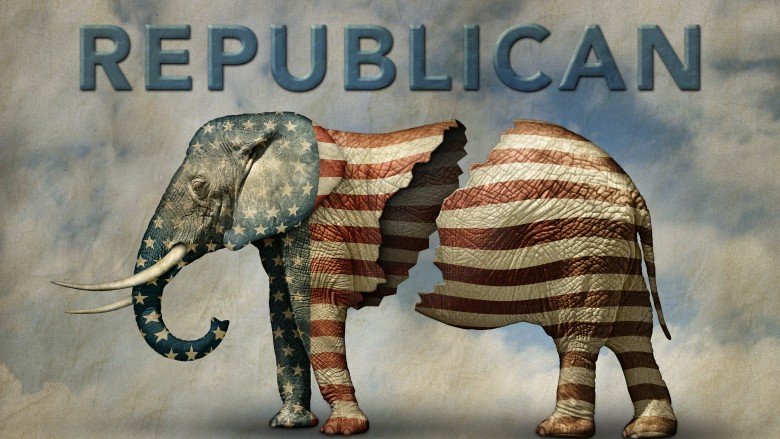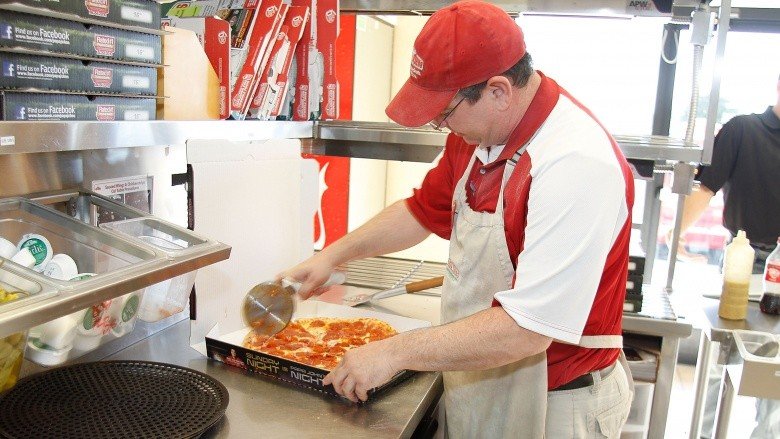Shady Things You Should Know About Papa John's
You've seen Papa John's face on countless pizza commercials, but what do you really know about the man—or the company—behind the pizza? The guy you see in the commercials isn't an actor. He's John Schnatter, and he really is the founder (and one-time CEO) of Papa John's, one of the biggest pizza chains in the country. He's also found himself embroiled in some pretty big controversies as of late—including a really nasty one that led to him leaving the company. We're guessing there's still a lot you need to learn about the guy, aside from the fact that he makes a darn good pizza, so here are some things you might not know about him, and the company he created.
He's claimed protesting NFL players are hurting the business
In 2017, Papa John's experienced the beginning of a very rocky road. After record profits in 2016, they released less-than-stellar financial reports for the third quarter of 2017. Shares dropped 11 percent after the numbers went public, and the net worth of Papa John himself dropped $70 million. You don't have to feel too badly for him — Forbes said he was still worth around $801 million — but he took it personally. According to Schnatter, the losses were the fault of the NFL and their inability to resolve the controversy around players kneeling during the national anthem. Papa John's is the official pizza sponsor of the NFL, after all, and more in-depth reports on ESPN showed just how much Schnatter blamed the NFL for his company's failings. "Leadership starts at the top, and this is an example of poor leadership," he said.
Papa John's was hailed as the official pizza of the alt-right
Schnatter pointing the finger at the NFL and blaming the ongoing player protests for his own company's declining business was just opening a whole can of ugly, ugly worms. It was only days later that neo-Nazi site The Daily Stormer (via The Huffington Post) published a piece on how Schnatter's accusations and opinions would make Papa John's a perfect candidate for becoming the official pizza of the alt-right. The suggestion was met with widespread, racist glee.
According to Business Insider, Schnatter's comments on the NFL protests aren't the only reason he's being hailed as a new pizza champion for the alt-right. He also denounced Obamacare in 2012, and later donated money to Donald Trump's presidential campaign.
Not surprisingly, Papa John's went into damage control mode, with an official statement to The Huffington Post from Peter Collins, senior director of public relations. It read, in part, "We condemn racism in all forms and any and all hate groups that support it. We do not want these individuals or groups to buy our pizza."
He stepped down as CEO
After 2017 proved to be a rough year for Schnatter, he announced he would be stepping down from his position as CEO in 2018. The move came on the heels of controversy after Schnatter blamed NFL protests for falling business numbers, and the following PR nightmare of white supremacist groups tripping over themselves to support him.
According to the Chicago Tribune, the Papa John's camp is keeping mum on whether or not the controversy is the reason he decided to step down in favor of longtime Chief Operating Officer Steve Ritche, or if there are other things going on behind the scenes. Ritchie also refused to comment on the reasons behind the shake-up. He did say it's "the right time to make this change," and added that Schnatter would still be the face of the company — especially when it comes to marketing.
The plan was for Schnatter to remain as chairman of the board, but that didn't last long...
Schnatter sued Papa John's
In July 2018, the Icelandic-saga-length story of Papa John's continued when the company was sued by its founder and namesake. Schnatter filed a lawsuit that claimed — among other things — that the company denied him access to records and books, that the board was "heavy-handed" with him, and that he was kicked out of the office space he sublet at their headquarters. According to Forbes, they were also mentioned in the lawsuit that claimed the news outlet had "falsely accused him of using a racial slur."
Schnatter admitted that the slur had come from his mouth, but his attorney stressed there was a difference between using it and quoting someone else who had used it... which is what he claimed to have been doing. The lawsuit also claimed there was some shady business going on behind the closed doors of the boardroom, and that the company had "planned this coup in advance."
Forbes reached out to Papa John's (the company), who responded: "We are saddened and disappointed that John Schnatter has filed a needless and wasteful lawsuit in an attempt to distract from his own words and actions."
Colleges cut ties with him
Schnatter's remarks have had some far-reaching consequences, and those consequences are perhaps best seen in the damaged relationship between the pizza giant and one-time benefactor the University of Louisville.
U of L — who once had Papa John's name and logo emblazoned across the campus, most notably on their Papa John's Cardinal Stadium — announced in July 2018 that they would be renaming it simply Cardinal Stadium. The switch came after Schnatter's slur-laden conference call, and according to CNBC, it ended a multi-million-dollar deal between Papa John's and the school.
They weren't the only ones to sever ties with the pizza-maker. Scholarships.com reported that the University of Kentucky, Morehouse College, and Oregon State all ended their associations with Papa John's, and WKYT News reported that even the John H. Schnatter Family Foundation agreed that it was time for his name to go. His moniker was dropped from the John H. Schnatter Institute for the Study of Free Enterprise, a business school largely founded and funded by Schnatter's contributions.
Employees have made some serious accusations
After the train started to come off the rails, former and present Papa John's board members and executives took steps that they had been contractually forbidden from taking before: they talked to Forbes about what really went on behind closed doors.
Forbes found that beginning in 2013, corporate employees were required to sign a nondisclosure agreement that prevented them not from sharing trade secrets, but from sharing anything about Schnatter's personal life. That means Forbes needed to do some serious digging, and spent months piecing together a story told by numerous — and often anonymous — sources, putting together a picture of what they described as the company's "bro culture." They uncovered settlements handed out after Schnatter was accused of stalking and sexual harassment, of pitting employees against each other, asking them to spy for him, and even of using disposable cell phones to conduct business.
All the shadiness and the toxic work environment employees and ex-employees said Papa John's fostered was allegedly driven by the people at the top. Forbes found corporate has had a long history of employing not the best people for the job, necessarily, but people who encourage a frat-boy culture thanks to their undying loyalty to Schnatter.
There were sexual harassment accusations, too
When employees finally started talking to Forbes in 2018 and sharing just what had been going on behind closed doors for years, one of the things that came up over and over again was an environment of sexual harassment and horrible treatment of female employees.
Forbes uncovered several settlements, handed out over cases of sexual harassment. One stemmed from an incident in 1999, when a mobile phone representative claimed Schnatter first groped, then stalked her. Schnatter's side of the story is quite different, and he claimed she tried to extort millions from him. The incident ended with a confidential settlement.
There was another confidential settlement reached regarded an incident with one of the company's female marketing employees, and Forbes says three other sources independently confirmed there were more secret settlements. Others sources say Schnatter was fond of asking women their bra sizes, giving unwelcome hugs, commenting on coworkers' wives, and encouraging coworkers to bring mistresses to corporate events. Other accusations leveled against other executives included creating a hostile environment where discussing porn and making lewd comments were the norm.
Stores have been used in the drug trade
If you happened to ask for extra olives on your Papa John's pizza from a certain Washington State location, you might have gotten a surprise. One store wasn't just selling pizza, but cocaine, Oxycodone, LSD, ecstasy, marijuana, and methamphetamine as well. Undercover officers bought drugs from restaurant employees on numerous occasions in a 2017 sting called Operation Extra Olives, and established the routine: after placing their order, they would simply wait in the parking lot for their pizza box full of drugs.
Papa John's issued an official statement, saying, "Papa John's has zero tolerance for this type of offensive and illegal behavior. The franchisee has confirmed that the employees involved with the situation are no longer employed and we apologize for their actions. The franchisee is working in full cooperation with local law enforcement to resolve this matter."
That store isn't the only one that's been linked to the drug trade, either. In 2013, a Papa John's delivery man in Brooklyn was arrested for delivering more than just pizza. Over the two years law enforcement had been investigating the store, around $40,000 worth of cocaine was sold to undercover officers alone.
The company was once sued over 16 cents
Going to court over 16 cents seems completely insane, but that's exactly what Zachary Tucker did in 2016. According to the lawsuit — which was filed in Madison County, Illinois — Papa John's had been breaking state laws with every delivery. While Illinois law states that business weren't allowed to collect taxes on delivery fees (as long as the price of the items were equal to or more than the delivery cost), Papa John's had been doing exactly that. That meant the extra 16 cents Tucker found on his bill was representative of a bigger problem, and he filed a class action lawsuit that cited things like breach of contract, negligent misrepresentation, and violation of the Illinois Consumer Fraud Act.
According to the official website for the class action lawsuit settlement, anyone who placed a delivery order from Papa John's between May 5, 2009 and May 6, 2016 was eligible for a piece of the pie. For their part, Papa John's denied any wrongdoing, but says they opted to settle the lawsuit by paying claimants instead of going through a lengthy and expensive trial.
They've had all kinds of disputes over paying their employees
Papa John's and its franchisees have had more than their fair share of disputes over paying their employees, and in 2015, more than 19,000 delivery drivers were awarded a settlement for their part in a lawsuit that was filed in 2009. According to the suit, drivers across six states were unfairly paid for their services. While AAA and the IRS both recommended a wage of between 45 and 55 cents per mile, Papa John's was regularly paying their delivery drivers between $1 and $1.50 per delivery, regardless of how many miles were traveled. The settlement was for no small change, either — the drivers split a whopping $12.3 million, dropping the company's quarterly profits by 36 percent.
That same year, Papa John's made headlines again when one of their franchisees was sent to jail for not paying his employees overtime. The New York City-based owner of nine locations was accused of creating false employees to bill overtime hours to, avoiding paying his actual employees time-and-a-half for their work. More than 300 employees were targeted by the scheme, and Abdul Jamil Khokhar ended up serving 60 days in jail and paying out $230,000.
Papa John owes someone a lot of pizza
When Schnatter was a college student at Ball State University, he was dreaming of the day he could open his own pizza shop. He approached a marketing major who lived a few doors down in his dorm and asked him to come up with a name and logo for his future shop, Schnatter explained to Business Insider. With that, the name and logo for Papa John's was born. He promised the designer he would give him a free pizza a week, for life, if his pizzeria plans ever took off. Only one problem — Schnatter has no idea who the guy is, and he's never come forward. Schnatter estimates that by now, he owes the clever man about $16,000 in pizza.
They were sued over sending text message spam... twice
In 2013, Papa John's was on the receiving end of another massive class action lawsuit, this time for sending around 500,000 spam text messages to customers. The suit's plaintiffs were looking for $250 million from the pizza giant, claiming it wasn't just the sheer volume of messages that were annoying, but the fact that some customers spammed in the middle of the night, and customers hadn't even authorized the service. While they were looking for at least $500 per text message to be paid out, they didn't get quite that much. Papa John's settled the suit for $16.5 million in 2013, even though they claimed they weren't at fault. Instead, they blamed the texting service they employed and claimed the customers in question had given the go-ahead to send the messages when they placed their order.
Shockingly, that's not the only time such a lawsuit has been filed against Papa John's, and in February 2017 Jonathan Anozie sued them for relentlessly bombarding him with deals for two large, 5-topping pizzas for $9.99. He cited mental anguish as the reason for his lawsuit.
There have been a number of racism accusations
Companies only have so much control over what their employees say or do, but Papa John's has been doing a huge amount of damage control when it comes to accusations of racism against their employees.
In 2013, John Schnatter himself issued a public apology after one of his company's delivery men accidentally redialed a customer and left a racist rant on his voicemail. The man was mostly complaining about the tip he'd been given, and the four-minute message was filled not only with racial slurs, but the sound of laughter coming from his coworker — both were fired. That came not long after another incident in New York City in 2012.
The year 2016 wasn't great, either. A 17-year-old customer received his pizza (from a Denver location) with a racial slur on the receipt in July, just a month after a Louisville, Kentucky woman got her pizza with another racist name written on it.
As for Papa John's stance, they issued a statement after the Denver incident that read, "This action is inexcusable and doesn't reflect our company values."
They were sued over their slogan
You're probably familiar with Papa John's slogan: "Better Ingredients. Better Pizza." It's straightforward enough, but in 1998, Pizza Hut sued them for false advertising. The claim was that there was no actual, concrete evidence that Papa John's was using better ingredients, or that those ingredients made a better pizza. According to Pizza Hut, the whole thing was in violation of something called the Lanham Act, which protects consumers from purposefully misleading advertising. In what was only the first blow to the story, Pizza Hut won, and Papa John's was ordered to pull all the so-called misleading marketing materials.
Papa John's appealed, saying it was clearly meant to be an opinion, not scientific fact, while also saying that there was no scientific proof that Pizza Hut had the "best pizza under one roof," so what gives? The ruling was overturned on appeal, and that's why you still hear the slogan today. (And it's also why Pizza Hut and Papa John's really, really hate each other.)
They were weirdly secretive about ingredients
Papa John's adopted their "Better Ingredients. Better Pizza." slogan in 1995, and you might think they'd be more than happy to tell everyone just what they were eating when they took a bite out of a Papa John's pizza. When food writer and journalist Melanie Warner tried to track down a Papa John's ingredient list in 2013, she found herself stonewalled at every turn. She found no ingredient lists on their website, in their stores, or in its own literature. Phone calls and requests for allergen information went unanswered, and when she went to her local Papa John's locations, it turned out that the employees didn't really know what was in the pizzas, either. Warner noted that not only did many chains voluntarily publish their ingredients, but that it was odd that Papa John's would opt out when their entire advertising campaign rested on the laurels of their ingredients.
The media ran with the discovery that proud Papa John's was mum on the actual details and today, you can find a list of all Papa John's ingredients on their website.
Papa John's has been accused of privacy violations
The Twitterverse exploded in 2015 after Iggy Azalea took aim at Papa John's in general and one of its drivers in particular after she found out he'd shared her phone number with his family, who then started calling her. According to her stream of tweets, not only did her number get shared, but she claimed that Papa John's refused to share photos of their employees so she could identify the driver.
That was in February, and in March she talked a little bit more with Ryan Seacrest about what happened and clarified that not only was she not pursuing legal action but that all was well. She had been issued a formal apology from corporate and been assured that all the appropriate disciplinary action had been taken, but Vice used the incident to bring up a major issue when it came to ordering food online, over the phone, or paying with a credit card. If you read the fine print of your Papa John's online account, there's a portion that says it's only by opting out that you forbid them from selling your information to "other merchants." That information is then compiled and sold by companies like NextMark, which means that not opting out of offers like Papa John's means that you might just find yourself on lists you'd prefer not to be on.
The first pizza shop was in a broom closet
Once his dad's tavern was in good standing, Schnatter knocked out a wall in the broom closet and started making pizza with used equipment. After a year of delivering pizzas out of the back of a bar, he had made enough in profits to open his first shop, the very first Papa John's.
Since then, the business has grown exponentially. Today, there are more than 4,700 Papa John's restaurants in the world, including more than 1,200 international shops in 37 countries. That's a long way to come from a pizza oven in a broom closet.
Schnatter owns a pretty ridiculous mansion
According to the popular real estate blog Curbed, Papa John resides in an over-the-top mansion in his home state of Kentucky that boasts a remarkable 40,000 square feet. The estate is complete with such lavish features as a 22-car garage, car wash, and 6,000-square-foot carriage house in addition to regular rich people amenities like a golf course and a swimming pool. To put these numbers in perspective, a typical one-bedroom apartment in New York City is about 750 square feet on average. Millionaire former presidential candidate Mitt Romney was reportedly in considerable awe upon visiting Schnatter's home. Coming from a man worth a whopping $250 million himself, that's really saying something.
Schnatter is a very vocal republican
It's no surprise that Papa John's recognizable red shirt and official company color is bright red. John Schnatter is an extremely rich and very public supporter of the Republican party and its conservative political agenda. A rich guy who wants to protect his wealth? Shocking. According to The Arizona Republic, Schnatter contributed a pretty sum of $20,000 to the party in July 2016 alone. In 2012, he openly criticized President Obama's healthcare plan by claiming that it would increase the price of pizza by 14 cents — the projected cost of providing insurance to his full-time employees! Many customers spoke out, saying they wouldn't mind paying an extra dime and nickel the next time they craved greasy pizza accompanied by that delicious garlic dipping sauce.
They hired mystery shoppers across the country
With so many stores nationwide, you might be wondering how John Schnatter deals with quality control of the pizzas that go out under his name. The answer? Mystery shoppers. When sales numbers plummeted in 1999, John knew he had to do something to reverse the slump. He put forth an initiative to employ anonymous shoppers to visit Papa John's locations for the purpose of tasting the pizzas and ensuring that they were up to standards. And it worked.
Papa John was a tough boss
Schnatter's success makes it apparent that he has high standards, but some former co-workers claim he takes things too far. Marketing expert Jack Trout, who has worked with Schnatter in the past, said Schnatter made others nervous, saying he walks up and down the halls "like a big cat, stalking." His attitude may have been the reason behind the company's once high turnover at the executive level, but Schnatter says his methods eventually became less harsh, and pointed to the fact that his executives at that time had an average of 12 years with the company.
He inspired fear at the store level, too. Schnatter liked to make surprise visits to his pizza shops to inspect their product for quality control, sometimes even dumping pies if they didn't meet his standards. "John's standards are so high," Chris Sternberg, a Papa John's vice president told People. "When you meet them you've really done something."
